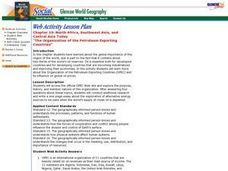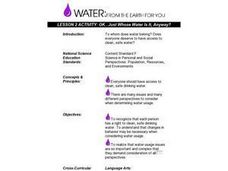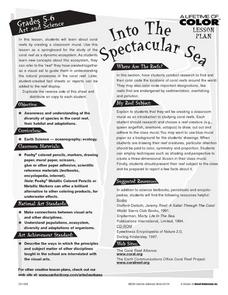Curated OER
Calculate Your Contribution
Young scholars assess the environmental impact of their transportation choices. They keep a transportation journal and use a website to calculate vehicle emissions for themselves and their class. They evaluate their transportation choices.
Curated OER
Integrated Solid Waste Management
Students examine the EPA's approach to integrated solid waste management. They read about source reduction, recycling, composting, waste-to-energy incineration, and land filling, and create symbols for each of the aspects of solid waste...
Curated OER
Getting to the Bottom
Pupils identify taxa in Arctic benthic communities. They discover organisms that live in these Arctic areas. They analyze data compiled for the Canada Basin Benthic Samples, 2002.
Curated OER
30 Good Reasons for Trees
Students create their own book about the role of trees in the environment. They are to come up with a list of 30 reasons they benefit the environment. They hold a publication party to release their book.
Curated OER
Cosmic Collisions and Risk Assessment
In groups, students create their own scientific impact experiments using ordinary materials, and observe and measure results with a variety of impacting bodies and velocities.
Curated OER
How Did That Get There?
Students evaluate the role of government in addressing land use and other environmental issues. They analyze the powers, responsibilities, and limitations of elected and appointed officials in the national legislative, executive, and...
Curated OER
I Need Room to Breathe
Seventh graders explore how exercise affects carbon dioxide levels in exhaled air.
Curated OER
All Caught Up!
Students discover the difficulty involved in trying to isolate a target species by fisherman. They discuss this issue and its problems as a class. They examine how bycatching affects their lives.
Curated OER
Venus Unveiled
Young scholars debate the validity of predictions about the greenhouse effect.
Curated OER
The Effects of Volcanoes
Students use the internet to research the effects of volcanoes. They create a chart showing the negative and positive aspects that a volcanoe can bring to an area. Using PowerPoint, they create a presentation showing the negative and...
Curated OER
Illinois' Habitats Happening
Learners use the scientific inquiry method to examine the ecosystems and biomes in Illinois. Using the characteristics of a local habitat, they identify the best conditions for an ecosystem to survive and how a slight change can damage...
Curated OER
Weather Wise
Students investigate weather and how to forecast it. They discuss the three types of clouds and the kind of weather they bring. After setting up a database, they reearch weather-related websites to check cloud conditions and weather...
Curated OER
Deforestation
Students identify the different tropical rainforests in the world using a map. In this ecology instructional activity, students describe the different methods of deforestation. They create a memo and present it to class.
Curated OER
The Organization of the Petroleum Exporting Countries
Learners investigate the global importance of the African and Asian countries that export petroleum. They access the OPEC website and research this organization. They answer questions and write an essay about alternative energy sources.
Curated OER
Regions: Meet the Experts Presentation
Students gather information and create a web site on prairies and plains using a variety of resources, including the internet.
Curated OER
Alaska's Physical Systems and History
Students read about Alaska's physical systems and determine how Alaska's physical makeup has impacted its history. They create timelines of their particular physical system.
Curated OER
3-D Posters
Students work in small groups to create 3-D posters to discourage throwing trash away and encourage recycling.
Curated OER
Leaf Slides
Students, in groups, examine leaf slides in order to explore the detail in leaves.
Curated OER
Toothpick Breakdown
Fourth graders model the activity of an enzyme acting on a substrate and observe relationships. Have students place toothpicks in a pile. One member of the team should break as many toothpicks as possible, in 10 seconds.
Curated OER
Terrestrial Ecozones, Population Density and Species at Risk
Tenth graders navigate and use the online Atlas of Canada. They explain the cause and effect relationship between human settlement and the natural environment and wildlife species. They utilize a worksheet imbedded in this plan.
Curated OER
OK...Just Whose Water Is It, Anyway?
Students recognize that each person has a right to clean, safe drinking water. They explain that changes in behavior may be necessary when considering water usage. They role play a water rights courtoom dispute.
Curated OER
The Phases of the Moon
Students view an applet to study the phases of the Moon in relation to the orientation of the sun, moon, and Earth.
Curated OER
Why Is An Apple Like A Suitcase?
Young scholars examine a variety of fruit to discover that each has seeds. Through experimentation, they discover the role that fruit and seeds play in a plant's life cycle.
Curated OER
Into the Spectacular Sea
Students research coral reefs as dynamic ecosystems and the part that each organism plays within that ecosystem. They create a mural of a coral reef.

























